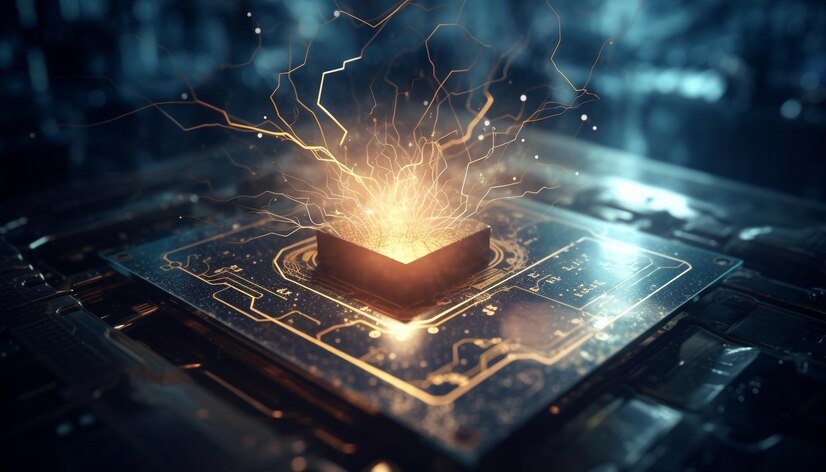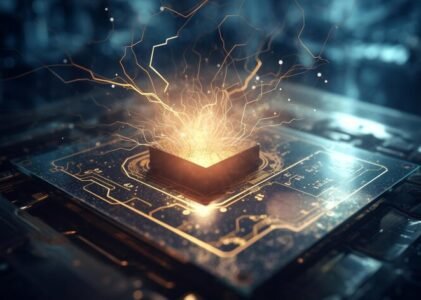HOW DOES A NORMAL COMPUTER WORK?

A normal computer today works on the basis of binary numbers (0 and 1) because our computers can’t process the decimal numbers (0 to 9). Transistors do the processing and since the amount of unique digits processed via the binary system are less, the binary system makes it much more efficient. Transistors are just on and off switches, so processing different numbers for them would be much more difficult.
As a result, the transistor, when receiving information in the form of binary numbers, processes them to make the computer work with the inputs it receives. A transistor, when off, represents 0 in the binary, and 1 when it’s on.
A single transistor is known as bit, and 8 bits are referred to as a byte, and so on (1024 bytes amount to 1 kilobyte and so on)
An ASCII code is used to convert binary information into “readable” information.
WHAT IS QUANTUM COMPUTING?

Remember how we discussed that normal computers store information as bits, which are either 0 or 1? Well, quantum computers, on the other hand, store information in the from of qubits! Qubits are able to exist in both states i.e. in a superposition, or in a combination of 0 and 1, which allows it to respond to input at a much greater pace, as opposed to normal supercomputers, since 1 qubit can perform much more computations than an average bit (by a factor of 2^n).
It performs computations by synchronizing at the shortest solution to the problem, due to the fact that a quantum system prefers to be in it’s lowest energy state.
Now, it can also “break” our current encryption methods.
Our current encryption methods are based on numbers i.e. we use numbers as data (binary form). If someone manages to correctly find the number’s prime factors, the person will have the number at his/her disposal. As a result, he/she can pretty easily access what the “hidden” information was. But, it’s not that easy, because the numbers aren’t 4,6,8, they’re 89678742806468047680476420674067730674 or 752094375309257329573590574549057405740957457309, and prime factorising such numbers (the numbers may be bigger) requires a million years for our present-day supercomputers
For this, it uses what is known as the “Shor’s Algorithm”, which is basically like turning a guess into a correct result.
For eg- Let’s say that you have to find the prime factors of 999 (which factors as 3*3*3*37)
This algorithm utilises the fact that p^n=m*b+1, which means that if you multiply a number by itself many times, you’ll eventually get to the product of two numbers plus one, which is immensely helpful in finding the factors for a number.
Now, you take a guess about a factor, even if it’s wrong
Let’s say 7.
Now, 7^n=999k+1 => 7^n-1=999k => (7^n/2-1)(7^n/2+1)= 999k and voila! You have one factor of the number, given that any of the members of the product of the terms in the left hand side doesn’t divide ‘k’! Here, the two factors in the LHS are the guesses that the Shor’s algorithm gives. Even if the terms do divide k, you still have the factors if you divide the LHS by k! Now, we can find common factors by applying Euclid’s division algorithm, and we are done. (+we can break an encryption through this method since an encryption relies on you not being able to guess the numbers which help keep a message safe 🙂
A quantum computer helps speed up this process because it gives you multiple answers at one due to superposition (many of them may violate each other, causing them to not be reliable enough). Now, the answers to this superposition repeat periodically. This can be found out by finding out the frequency , which is 1 over p, leading us to an eventual factor [g^(p/2)+1 or g^(p/2)-1]. The frequency can be found out via the quantum version of the Fourier transform, which converts inputs into frequencies (obtained in the form of sine waves. Most of the sine waves will cancel each other out). The wrong frequencies will interact with each other and destroy each other, leading to the right frequency to remain. So, we get 1/p
If we have 1/p, we have p, (by the way, p equals n) which implies that we have the factors of the number, breaking the encryption. (this only works if p is even, because the encrypted set of numbers are integral)
However, this algorithm isn’t completely reliable, (in our current conditions) due to which we may not be able to break the encryption. It only gives us with a better guess so that the quantum computer can carry out the computation faster. Quantum computers generate a lot of heat and attaining required temperatures (so that the atoms don’t interact with each other) is quite a notorious task (like attaining room temperature superconductivity!). Also, our current models for applying said algorithm aren’t that pumped on memory, due to which we can do no better than prime factorising 15 (via this method). Good luck with the later part because as it has happened in several other blog posts of mine related to quantum physics, if we manage to get it to work in normal conditions and combine it with general relativity, room temperature superconductivity would allow us to perform this computation at an even better pace because of no electrical resistance, making the internet a less safer place….
HOW IS IT USEFUL?

Well, if you’ve not already found out by now, quantum computing can potentially boost computer performance to a level which will help humanity take giant leaps in the field of technological development, creating a bridge between us and the universe, for we are left with a lot of secrets that the universe is hiding from us….
HOW HAS IT HELPED US?

Well, because of restraints which we have discussed above, quantum computing is still a dream… (for us)
It can help us make giant strides in technological development, as well as in other fields of life
For example,
1. In the present time, to make a drug against a particular virus/pathogen, we have to test out different molecules against it to find out which one will work. Quantum computing can help speed up this process by helping in speeding the testing time.
2. Better batteries and superconducting materials can be discovered via faster hit and trial, advancing our current technology.
3. We’ll become the greatest predictors of all time because by observing atoms, we can pretty easily find out what’s going to happen why such computations
4. It’ll help us speed up processes which require a lot of repitition, which is something which AI is doing as well…
5. It’ll help break any password
6. It’ll help protect data better as well, because it’s random, and current “0-1” computing is very predictable. (which is why hackers exist)
7. It can work out problems which require a lot of hit and trial much faster, since it can do several trials at one time
THEREFORE, quantum computing can be hugely beneficial, but we need to overcome some obvious constraints
Here’s a link to a video explanation of the same:-


